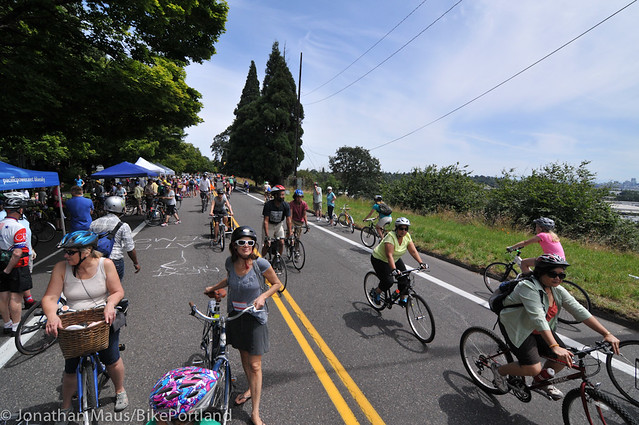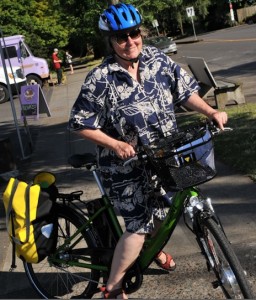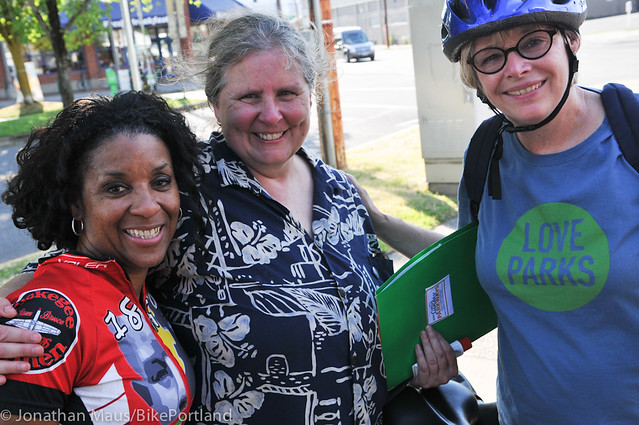
(Photos: J.Maus/BikePortland)
Over beers at the Hopworks Bike Bar happy hour Saturday, Seattle City Councilor Sally Bagshaw didn’t bother dithering over whether Portland’s Sunday Parkways street festivals are an idea worth spending city money on.
“We are determined to,” she said, waving dismissively at the question.
“Middle-aged, not super physically fit people are the ones who need to say, ‘It’s not so hard.’ … People don’t want to get into shape. They just want get about their lives.”
— Cathy Tuttle, Seattle Neighborhood Greenways
Bagshaw, who oversees Seattle’s parks department, spent last weekend in Portland as part of a 19-person delegation led by a three-year-old advocacy group whose success remaking Seattle transportation could be a model for bike advocates across the country.
Since its founding in 2011, Seattle Neighborhood Greenways has almost singlehandedly convinced the city to install 35 miles of bike routes modeled on Portland’s internationally famous 60-mile network of low-stress side streets. Now, by leading a weekend trip to Portland, the organization is paving the way for another import: a series of one-day summer open-streets festivals.
Yes, these are the events, modeled on Latin America’s ciclovias, that draw up to 30,000 participants five times a year and that The Oregonian once described in a momentous front-page story as “a handful of neighborhood bike rides.”
But for Bagshaw, along with Seattle DOT’s Kristen Simpson, interim SDOT Deputy Director Barbara Gray and Seattle Parks recreation director Kelly Guy, joining the SNG study tour to Portland was an opportunity to learn more about one of the key ways Portland communicates the benefits of its infrastructure to its residents.
“I just think what you guys have got with Sunday Parkways are the coolest thing ever,” Bagshaw said.
A couple hours later, sitting outside Ruby Jewel ice cream shop on North Mississippi Avenue, SNG’s founding director Cathy Tuttle talked about her philosophy for getting Seattlites to ride bicycles.
“How do we say, ‘It’s the coolest thing you can do. It’s the sexiest thing you can do. It’s the thing that will make you happy, healthy and wealthy’?” she asked. “People need to hear that message from their neighbors. They need to long to be the person who can easily zip up, put their bike there and come to this bar and then easily come over to get ice cream.”
Advertisement
Whatever Seattle has been doing lately, it’s working. Bike traffic over the Fremont Bridge is up 14 percent this year and (though even Tuttle is skeptical of this finding) the bike counts on two new neighborhood greenways are up more than 600 percent.
Tuttle’s organization, which has just two paid staff, has been turning heads in Seattle for its extremely effective political organizing. Tuttle has deputized volunteers in 26 Seattle neighborhoods to gather local support for greenways.
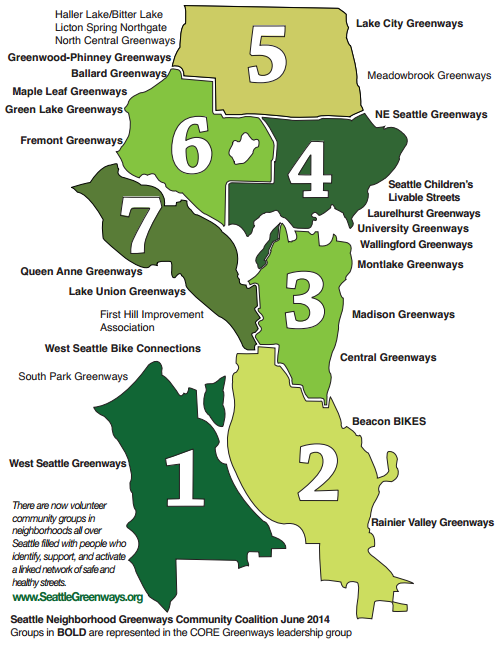
its neighborhood affiliates is divided up into
city council districts. Spreading the love has been
key to the group’s strategy.
In 10 years, their goal is to have a 250-mile network of linked routes, including some multi-use paths and protected bike lanes, throughout the city.
“It’s very strategic political action,” said Tuttle, whose influence at the city is such that she was invited to personally weigh in on the selection of Scott Kubly as Seattle’s new transportation director.
(Kubly and Portland’s transportation director, Leah Treat, have been peers for years: they were the two closest deputies of former Chicago and Washington DC transportation director Gabe Klein.)
It’s work that seems well suited to Tuttle, a former organizer for climate-watchdog group 350.org who says her strength as a community organizer is “finding other people’s strength.”
It doesn’t hurt that Tuttle herself, who said she’s almost 60 and rides an e-bike, doesn’t look the way people expect a biking advocate to look.
“In a way, I’m the poster child for what needs to happen,” she said. “Middle-aged, not super physically fit people are the ones who need to say, ‘It’s not so hard.’ I think that’s a mistake a lot of bicycle advocacy groups make, is they try to get people into shape. People don’t want to get into shape. They just want get about their lives.”
SNG also makes a point not to make biking the core of its public message. The group responds with public events and pressures city hall for action after any walking-related fatality. Its alliance with the city to endorse Seattle’s current parks ballot measure grows out of SNG’s message that neighborhood greenways are a cheap, simple way of turning neighborhood streets into de facto parks.
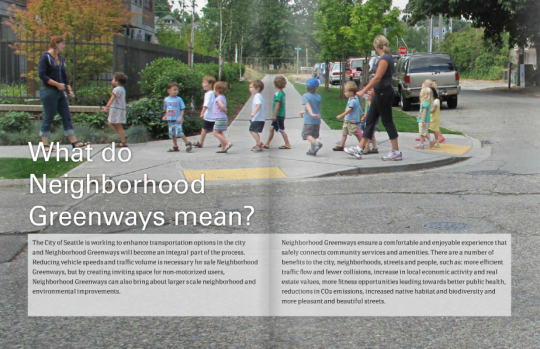
But though Tuttle and her team are obviously proud of their work and confident of their influence in Seattle government, they’re also huge fans of Portland and a city staff who Tuttle says is full of visionary, socially adept planners, project managers and engineers.
Mark Ostrow, Tuttle’s lead organizer in the Queen Anne neighborhood and a Portland native, said he visits the city every chance he gets, and is confused when he gets the sense that biking advocates here are discouraged.
“Maybe you shouldn’t wring your hands and gaze at your navel so much,” Ostrow said. “This is someplace people still go to for pilgrimages.”
Correction 7/31: An earlier version of this post inaccurately credited the creators of the Toolkit pictured above.

